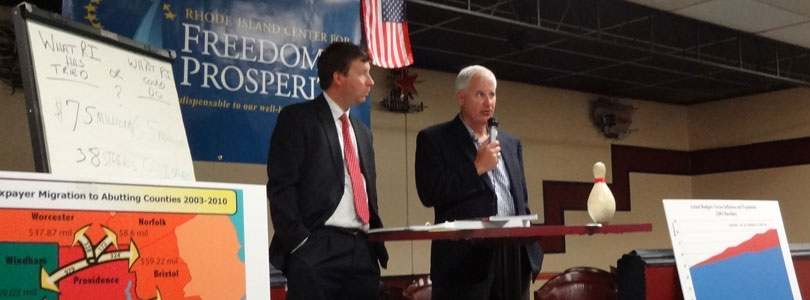Free Market Agenda Needed to Counteract Power of Insiders, Say Center for Freedom and ALEC Speakers
Rhode Island is consistently ranked as one of the poorest, and least economically viable of all 50 states, because lawmakers place too much faith in the public sector, according to free market activists who took part in a press conference last Thursday in Cranston.
But even modest steps in the right direction could attract business and investment back into the state, which is strategically positioned in the northeast corridor to serve as a vital gateway for national and international trade and commerce, they said.
“The big problem with Rhode Island is that it has become overly reliant on the public sector and its elected officials continue to shape policy with eye toward taxpayer funded benefits for government employees,” Jonathan Williams, the director of the Center for State Fiscal Reform and Tax and Fiscal Policy Task Force at the American Legislative Exchange Council (ALEC). “Rhode Island has been ranked near the bottom for every year we have down our state survey.”
Williams is the co-author of “Rich States, Poor States,” which ranks states in terms of economic competitiveness. The just released 5th edition calls attention to policies that hinder investment, discourage business, and drive up consumer costs. The report then juxtaposes this failed approach with free market solutions that are working.
During the press conference, Mike Stenhouse, the president and CEO Rhode Island Center for Freedom and Prosperity (the Current’s parent organization), pinned the blame on “restrictive legislation” that must be uprooted before the Ocean State can begin to attract new business.
“We have a failed economy because we have the worst business climate in the country,” Stenhouse said. “We have a bad business climate because we have bad public policy. If we want a good economy, we must get rid of bad legislation.”
The Center advocates a “Get Government Out of the Way” approach to public policy that would remove “legislative barriers to success” that undermine economic and individual freedom. The strategy is built around “three proven steps” identified by the Center:
- Embrace the free-enterprise system as the means to restore prosperity
- Follow and learn from successful economic policies implemented in other states
- Design and implement public policy reforms reflective of the above, applied evenly and universally
But before any of these changes can be set into motion, Rhode Island must first reexamine the mindset that first gave rise to irresponsible budgeting practices and higher rates of taxation, said Ellen Kenner, an activist with the Northwest Tea Party.
“We have to ask ourselves what underlies big government and the bloated budgets and higher taxes that go with it,” Kenner observed. “There’s a moral code that says the state should take care of us and control our lives, that’s what needs to change. If we value the human mind, it should not be chained in the first place.”
Mark Zaccaria, the state’s Republican Party chair, said the next few election cycles will be critical to Rhode Island’s future.
“With just a few more seats in the General Assembly, we could begin to move in more of a free market direction and do this on a bipartisan basis,” he said. “Right now, there is just too big of a majority. This means there is no serious deliberation, and no transparency. The goal here is to dimish the majority just enough so that we could be in position to sustain a veto, and that would change the dynamic.”
The Center’s “Freedom Index,” which ranks lawmakers based on how their voting record impacts state finances and constitutionally limited government is very telling, Zaccaria added.
“It shows the Republican Party is serious about reform, and that we do have some partners on the other side,” he said. “In the end, it comes down to the voters will do.”
Jack Peters, who is active with the Rhode Island Federated Sportsman’s Club, said the techniques his organization, and others, have applied to protect and expand Second Amendment rights, can also be used to secure gains in other areas that are important to the free market.
“Right now Rhode Island is a little island in between Massachusetts and Connecticut where there is freedom to purchase firearms,” he explained. “That didnt’ happen overnight. We made sure the General Assembly knew there was a large voting bloc that was engaged on this issue, and that was watching. ”
In recent years, the General Assembly has catered to special group demands at the expense of taxpayer interests, the Center has argued. As result, legislative barriers have been erected that restrict economic freedom and create disincentives.
“Rhode Island has the worst business climate in the nation because we have one of the most burdensome tax and regulatory environments, leaving families with fewer opportunities and options to pursue a productive life of their own choosing,” Stenhouse, the Center CEO, said.
“More and more it seems that restrictive laws and government programs are running our lives and creating obstacles to prosperity.”



